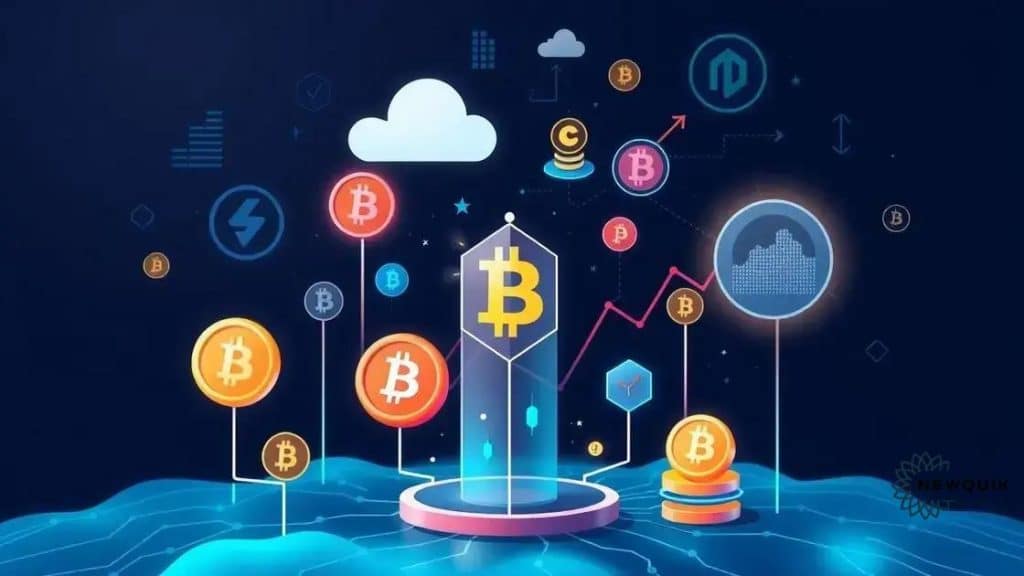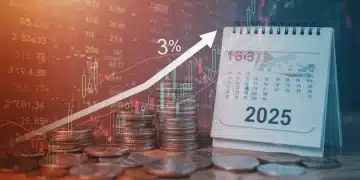Decentralized Finance (DeFi): Exploring New Financial Frontiers

Anúncios
Decentralized Finance (DeFi) is a financial ecosystem built on blockchain technology, enabling users to access financial services directly without intermediaries, offering benefits like higher returns and increased transparency while also presenting risks such as security vulnerabilities and market volatility.
Decentralized Finance (DeFi) is reshaping the world of finance by challenging traditional banking. Have you ever wondered how blockchain technology can provide opportunities without intermediaries? In this article, we’ll dive into the essentials of DeFi and why it matters to you.
Anúncios
Understanding decentralized finance (DeFi)
Understanding decentralized finance (DeFi) is essential in today’s financial landscape. DeFi is a new way of managing financial services without traditional banks. By leveraging blockchain technology, DeFi platforms allow users to trade, lend, and earn interest on their assets in a decentralized manner.
These platforms range from stablecoins to decentralized exchanges. Each plays a crucial role in this emerging ecosystem, providing users with increased accessibility and transparency. Without intermediaries, users can interact directly with the blockchain, making financial transactions faster and often cheaper.
Key Features of DeFi
One major advantage of DeFi is the ability to access services without the need for a bank account. This opens doors for millions who are unbanked or underbanked globally. Security is another important aspect, as transactions are verified by the blockchain network rather than a central authority.
Anúncios
- Permissionless access to financial services
- Greater security and transparency of transactions
- Smart contracts automate processes
- Global market participation
Moreover, the use of smart contracts enables automatic execution of agreements when pre-set conditions are met. This eliminates the need for trust and reduces the chances of fraud or manipulation. As the DeFi space grows, the possibilities for innovation expand, leading to novel financial products that challenge traditional methods.
With DeFi, users can earn passive income through liquidity pools or yield farming, where they provide liquidity to a platform in exchange for interest or rewards. This new investment opportunity is captivating, as it allows users to manage their finances flexibly and independently.
Key components of DeFi platforms
Key components of DeFi platforms lay the foundation for how decentralized finance operates. One essential element is blockchain technology. This technology ensures security and enables transparency in transactions, allowing users to trust the system without relying on traditional banks.
Smart contracts are another critical piece. They automatically execute transactions when specific conditions are met. By eliminating intermediaries, these contracts streamline operations and reduce costs. This means faster transactions and lower fees for users.
Popular Components of DeFi Platforms
In addition to smart contracts, decentralized applications (dApps) play a significant role in the DeFi ecosystem. These applications provide user-friendly interfaces that simplify access to DeFi services, making it easier for everyone to participate.
- Decentralized exchanges (DEXs) allow users to trade cryptocurrencies directly.
- Liquidity pools enable users to earn by providing their assets to the platform.
- Stablecoins maintain price stability, offering a reliable medium for transactions.
- Yield farming allows users to stake their cryptocurrency and earn rewards.
Another vital component is the role of oracles, which provide external data to smart contracts. These data feeds ensure that contracts function accurately based on real-world conditions, making them reliable and efficient. Furthermore, governance tokens empower users to have a say in decisions regarding platform developments and changes. This decentralization ensures community involvement and reflects a true democratic process.
As the DeFi space continues to grow, understanding its key components remains crucial. The collaboration of these elements creates a financial ecosystem that is innovative and accessible for everyone, promoting broader participation in financial markets.
Benefits of adopting DeFi solutions

Adopting DeFi solutions offers a multitude of benefits, transforming how individuals manage their finances. One major advantage is financial inclusivity. DeFi allows anyone with internet access to participate in financial activities without the barriers of traditional banking systems.
Another significant benefit is the potential for higher returns. Users can earn interest on their investments by lending their assets through decentralized protocols. This often yields better returns than traditional savings accounts or investment options.
Key Advantages of DeFi
Transparency is another key advantage associated with DeFi platforms. All transactions are recorded on public blockchains, making them accessible and verifiable by anyone. This feature reduces the risk of fraud and increases trust among users.
- Access to a variety of financial services without intermediaries.
- Lower transaction fees compared to traditional financial institutions.
- Ability to control personal assets without relying on third parties.
- Opportunity for innovation with new financial products.
In addition, DeFi solutions enable users to retain full control over their assets. Unlike traditional banks, where customers must trust institutions to safeguard their money, DeFi allows individuals to manage their own wallets and transactions. This autonomy can boost a sense of ownership and responsibility.
Moreover, the decentralized nature of these platforms means they are less susceptible to failures caused by centralized systems. Users can take advantage of global liquidity and markets, significantly broadening their investment horizon. As DeFi continues to develop, it opens new pathways to financial freedom and independence, revolutionizing personal finance.
Risks associated with DeFi investments
While investing in DeFi offers many opportunities, it also comes with significant risks that potential investors should understand. One of the primary risks is smart contract failure. If there is a bug in the code, it can lead to losses for users. These contracts dictate how transactions are executed, and any errors can cause unintended consequences.
Another risk involves liquidity issues. In a DeFi platform, if there aren’t enough participants, users might find it challenging to trade their assets at favorable prices. This can lead to slippage, which means the value of the trade differs from the expected price, potentially causing financial loss.
Common Risks in DeFi Investments
Security vulnerabilities are also a primary concern in DeFi. Hackers may target platforms to steal funds or exploit weaknesses. Such incidents have occurred in various DeFi projects, making it crucial for investors to choose reputable platforms. Understanding the security measures that a platform has in place is vital before committing funds.
- Market volatility can affect the value of assets quickly.
- Regulatory uncertainty may impact the operational status of DeFi platforms.
- Risks associated with impermanent loss when providing liquidity.
- Potential scams or poorly designed projects that may lead to losses.
Furthermore, regulatory challenges pose risks for DeFi users. Governments around the world are still figuring out how to manage this emerging sector, and changes in regulations might affect the viability of certain platforms. Investors should stay informed about regulatory measures in their jurisdiction to avoid potential issues.
Finally, educating oneself about the risks and rewards of DeFi is essential. Engaging in thorough research can help investors make informed decisions and mitigate potential losses. Overall, being aware of these risks is crucial for any investor considering stepping into the world of decentralized finance.
Future trends in DeFi technology
The future of DeFi technology looks promising, with several trends poised to shape the financial landscape. One significant trend is the integration of artificial intelligence (AI) with decentralized finance. AI can analyze vast amounts of data to enhance decision-making, improve risk assessment, and automate trading strategies.
Another emerging trend is the growing focus on interoperability between different blockchain networks. As various DeFi protocols expand, seamless interactions will become crucial for users to take advantage of multiple services without complications. This interoperability will allow for easier asset transfers and better liquidity across platforms.
Predicted Trends in DeFi
Moreover, the use of layer-2 solutions is increasing. These solutions help scale blockchain networks by processing transactions faster and at lower costs. As user demand rises, implementing these technologies can make DeFi platforms more efficient and user-friendly. Additionally, decreased transaction fees will attract more participants into the ecosystem.
- Increased regulatory clarity is anticipated, leading to more institutional adoption.
- The rise of decentralized autonomous organizations (DAOs) will empower community governance.
- Enhanced security protocols will emerge to protect user funds and data.
- More comprehensive financial services, such as insurance and mortgages, will be offered.
Sustainability is also becoming a focal point as the DeFi sector grows. More projects are exploring eco-friendly practices, ensuring that their operations are not only profitable but also environmentally responsible. This shift will likely attract environmentally conscious investors and promote broader acceptance.
As these trends unfold, the DeFi landscape will evolve rapidly, presenting new opportunities and challenges. Keeping an eye on these developments will be crucial for investors and enthusiasts eager to navigate the future of decentralized finance.
decentralized finance (DeFi) is thriving and constantly evolving. As more individuals seek alternatives to traditional banking, DeFi presents innovative solutions that offer unprecedented control and opportunities. However, with its growing popularity come various risks and challenges that users must navigate. Staying informed about these dangers and future trends is crucial for anyone looking to engage with DeFi. By understanding the key components and benefits, users can explore this new financial landscape while making informed choices to protect their assets.
FAQ – Frequently Asked Questions about Decentralized Finance (DeFi)
What is decentralized finance (DeFi)?
Decentralized finance (DeFi) refers to a financial system built on blockchain technology, allowing users to access financial services without traditional banks.
What are the main benefits of using DeFi solutions?
DeFi solutions offer benefits such as greater financial inclusivity, the potential for higher returns, and increased transparency in transactions.
What risks should I be aware of when investing in DeFi?
Investors should consider risks like smart contract failures, liquidity issues, hacking incidents, and regulatory uncertainties.
How is the future of DeFi technology evolving?
The future of DeFi technology includes trends like AI integration, improved interoperability between blockchains, and sustainable practices.





